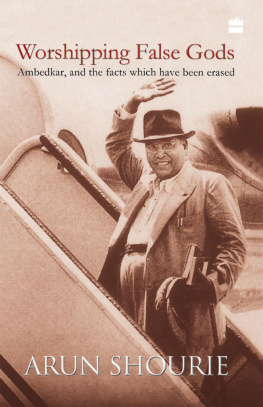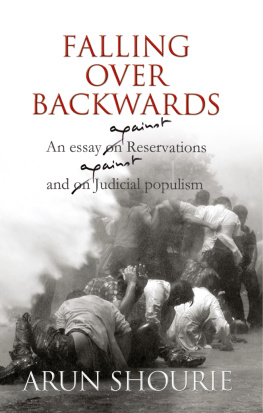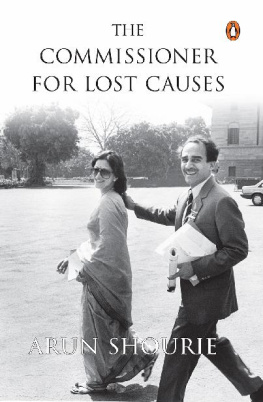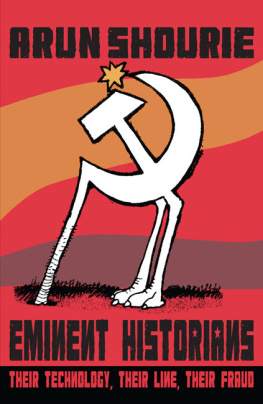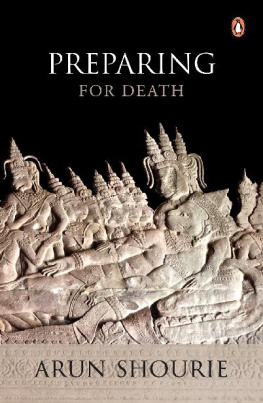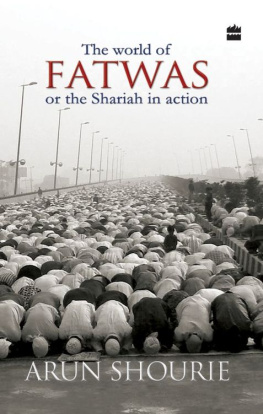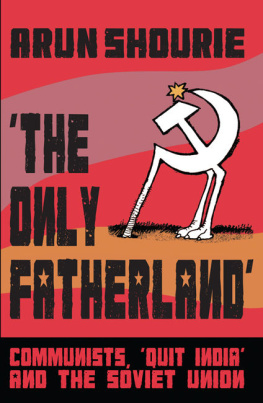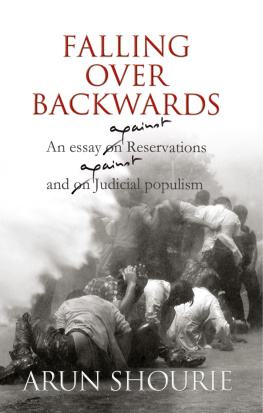Arun Shourie - Worshipping False Gods
Here you can read online Arun Shourie - Worshipping False Gods full text of the book (entire story) in english for free. Download pdf and epub, get meaning, cover and reviews about this ebook. year: 2012, publisher: HarperCollins, genre: Politics. Description of the work, (preface) as well as reviews are available. Best literature library LitArk.com created for fans of good reading and offers a wide selection of genres:
Romance novel
Science fiction
Adventure
Detective
Science
History
Home and family
Prose
Art
Politics
Computer
Non-fiction
Religion
Business
Children
Humor
Choose a favorite category and find really read worthwhile books. Enjoy immersion in the world of imagination, feel the emotions of the characters or learn something new for yourself, make an fascinating discovery.
- Book:Worshipping False Gods
- Author:
- Publisher:HarperCollins
- Genre:
- Year:2012
- Rating:5 / 5
- Favourites:Add to favourites
- Your mark:
- 100
- 1
- 2
- 3
- 4
- 5
Worshipping False Gods: summary, description and annotation
We offer to read an annotation, description, summary or preface (depends on what the author of the book "Worshipping False Gods" wrote himself). If you haven't found the necessary information about the book — write in the comments, we will try to find it.
Worshipping False Gods — read online for free the complete book (whole text) full work
Below is the text of the book, divided by pages. System saving the place of the last page read, allows you to conveniently read the book "Worshipping False Gods" online for free, without having to search again every time where you left off. Put a bookmark, and you can go to the page where you finished reading at any time.
Font size:
Interval:
Bookmark:
Worshipping False Gods
Ambedkar, and the facts
which have been erased
ARUN SHOURIE

For those few
who speak the truth
to the people also...
A nation forges deities in its imaginings, in its sacred literature, in wood and stone. The forms it gives them, the forces it has them embody, the virtues with which it endows them reflect the accumulated experience of the nation, the insights of its seers; they answer to its needs. When the nation is overpowered physically, when it is vanquished spiritually and intellectually, it is made to shift, and per force it actually shifts those representations from public places and cabines them within private dwellings. Next, within those dwellings it herds them into almirahs. Soon enough it is made to feel ashamed of, and it actually becomes ashamed of those deities and representations. Eventually it repudiates its own gods, its own tradition, its own history and experience, and starts worshipping the gods of the conquerors.
This sequence was in full swing in northern India by the fourteenth-fifteenth century, and would have proceeded to completion had the country not been saved by the bhakti movement. By the late nineteenth century again the process was gathering momentumthe Christian missionaries, Macaulay were all set to succeed. The country was rescued from drowning by Swami Dayananda, Ramakrishna Paramahamsa, Swami Vivekananda, by Sri Aurobindo, by Narayan Guru, by Bankim Chandra Chatterjee and a handful of others. They reminded us of our heritage, they restored our faith in our traditions, our gods and goddesses, in our forms of worship, in a word in ourselves. They showed us that far from being ashamed of our past, our nation and country had gleaned and then, in spite of the vicissitudes of centuries, preserved for the world the pearl of great price.
The net result of the last fifty years is that once again in India today that same sequence is afoot. The Lokmanya is as good as forgotten. Few outside Kerala know of Narayan Guru. Apart from a narrow circle of devotees no one remembers what Swami Dayananda, Ramakrishna Paramahamsa, Sri Aurobindo, Ramana Maharshi, the Paramacharya at Kanchi did to stand us on our feet. Swami Vivekananda is dusted up and taken out on occasiondressed up exactly as the secularist he would have berated. Gandhiji is in the dock every dayone day for having been a throwback, the next for having pushed the Muslim leaders into insisting on Pakistan. And persons like Ambedkar are deified.
Indeed, no one is idolized these days the way he is. His statue is one of the largest in the Parliament complex. His portrait in the Central Hall of Parliament is larger than life. The Bharat Ratna has been conferred on him posthumously, a national holiday has been decreed in his honour. Postage stamps have been issued in his honour. Universities have been named after him. His statuesdressed in garish blue, holding a copy of the Constitutionhave been put up in city after city: it is a fair guess that by now they far outnumber those of Gandhiji. Politicians, activists and other notables flock to these on several anniversaries of hison the anniversary of his birth, on the anniversary of the day on which he converted to Buddhism, on the anniversary of his parinirvana, the term which must compulsorily be used now for his death. He is hailed as the one who gave us the Constitution we now havethe fourteen volumes of his speeches and writings which have been published in his honour officially by the Government of Maharashtra include the Draft Constitution among his writings. He is hailed as the one who strove to lift the lower castes, indeed the dispossessed in general. Not just that, while Gandhiji and other Congress leadersprovided of course that they were Hindus, at least by birthare held to have been responsible for the Partition of the country, because of the propaganda surrounding his name Ambedkar is assumed to have been, and shown to have been one of the fighters for the countrys freedomin the television spots which were put out by government to mark the fiftieth anniversary of the countrys Independence, Ambedkars photograph has been shown between those of Bhagat Singh and Subhash Chandra Bose!
Several factors account for this inversion. During the last fifty years the history of the countrys struggle for freedom has been reduced to a few paragraphs in high school textbooks. Indeed, nationalism has been made a dirty word. Moreover, with less and less to commend themselves, politicians have lunged for casteist politicsand so they have made icons of persons like Ambedkar.
But in addition there is a factor for which our intellectuals are directly responsible. Discourse today consists of slogan-cum-stampede. Some slogan is floated Garibi Hatao one day, Social Justice the next. No one goes into the details of it. Instead, there is a stampede in its wake. In the case of persons like Ambedkar and their deification there is in addition verbal terrorism, and, increasingly, actual, physical assault: once the slogan has been put out, and the stampede with it as the banner has begun, anyone who draws attention to the facts, even to the things which the man himself said and did, things which he flaunted, that person, as I can testify from personal experience, is set upon.
Soon what started as the convenience of some politician becomes myth, and myth becomes fact. And the country adopts as its deities the very ones who had striven for decades and decades with its enemies to keep it in subjugation.
Disorientation, and from that disarray, and thence disintegration are the certain outcome.
Ambedkars public life begins in a sense from a public meeting held at the Damodar Hall in Bombay on 9 March 1924. The struggle for freeing the country from the British was by then in full swing. Swami Vivekanandas work, Sri Aurobindos work, the Lokmanyas work had already stirred the country. Lokmanya Tilak had passed away in 1920. The leadership of the national movement had fallen to Gandhiji. He had already led the country in the Champaran satyagraha, the Khilafat movement, in the satyagraha against the Rowlatt Act, against the killings in Jallianwala Bagh and the merciless repression in Punjab. This national movement culminated in the countrys Independence in 1947. In a word, a quarter-century of Ambedkars public career overlapped with this struggle of the country to free itself from British rule. There is not one instance, not one single, solitary instance in which Ambedkar participated in any activity connected with that struggle to free the country. Quite the contraryat every possible turn he opposed the campaigns of the national movement, at every setback to the movement he was among those cheering the failure.
Thus, while the years culminated in the countrys Independence, in Ambedkars case they culminated in his becoming a member of the Viceroys Council, that isto use the current termsa minister in the British Cabinet in India.
The writings of Ambedkar follow the same pattern. The Maharashtra government has by now published fourteen volumes of the speeches and writings of Ambedkar. These cover 9,996 pages. Volumes up to the twelfth contain his speeches and writings up to 1946. These extend to 7,371 pages. You would be hard put to find one article, one speech, one passage in which Ambedkar can be seen even by inference to be arguing for Indias Independence. Quite the contrary.
Pause for a minute and read the following:
Allow me to say that the British have a moral responsibility towards the Scheduled Castes. They may have moral responsibilities towards all minorities. But it can never transcend the moral responsibility which rests on them in respect of the Untouchables. It is a pity how few Britishers are aware of it and how fewer are prepared to discharge it. British Rule in India owes its very existence to the help rendered by the Untouchables. Many Britishers think that India was conquered by the Clives, Hastings, Cootes and so on. Nothing can be a greater mistake. India was conquered by an army of Indians and the Indians who formed the army were all Untouchables. British Rule in India would have been impossible if the Untouchables had not helped the British to conquer India. Take the Battle of Plassey which laid the beginning of British Rule or the battle of Kirkee which completed the conquest of India. In both these fateful battles the soldiers who fought for the British were all Untouchables...
Next pageFont size:
Interval:
Bookmark:
Similar books «Worshipping False Gods»
Look at similar books to Worshipping False Gods. We have selected literature similar in name and meaning in the hope of providing readers with more options to find new, interesting, not yet read works.
Discussion, reviews of the book Worshipping False Gods and just readers' own opinions. Leave your comments, write what you think about the work, its meaning or the main characters. Specify what exactly you liked and what you didn't like, and why you think so.

